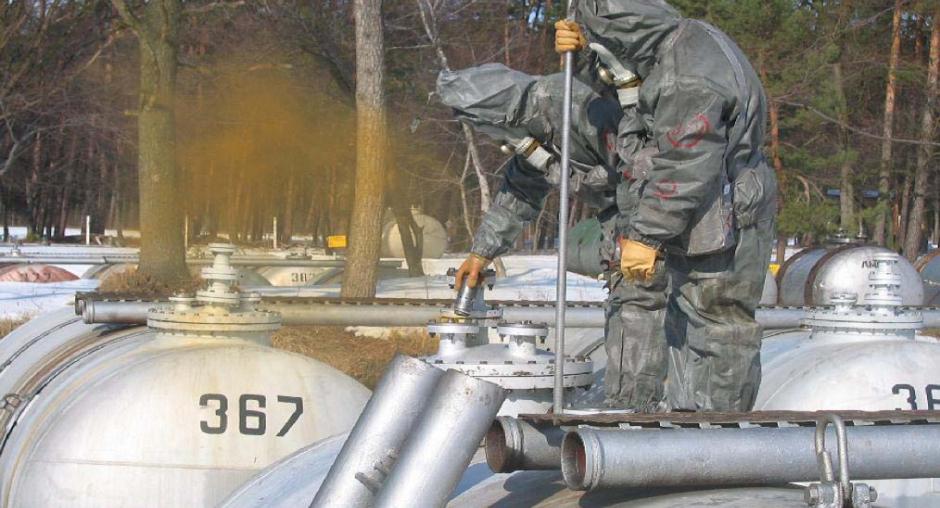OSCE-NATO meeting in Ukraine focuses on disposal of dangerous rocket fuel

KYIV, 8 July 2005 - Finding a comprehensive solution to the major threat to health and environment posed by the toxic missile fuel component, commonly known as melange, was the focus of a joint OSCE-NATO workshop that ends today in the Ukrainian capital.
During the three-day workshop, experts and representatives of countries facing this problem (Georgia, Armenia, Ukraine, Uzbekistan, Azerbaijan, and Kazakhstan) have shared information on its extent and on the best technologically and environmentally sound solutions.
Melange is a highly unstable missile fuel component that was used for rockets and guided missiles in the former Soviet Union. It is a very complex chemical substance, whose components are extremely reactive, volatile and highly toxic. It thus urgently requires neutralization.
After its collapse, large stocks were left on the territory of the former republics of the USSR. Many OSCE or NATO partner countries are unable to solve this problem alone due to the lack of necessary technical, material and financial resources. Therefore, international assistance is urgently needed.
"Melange disposal is a priority for us," said the Ukraine Deputy Defence Minister Volodymyr Tereshchenko, opening the workshop.
Dr. Chris De Wispelaere from the NATO Public Diplomacy Division said: "Bringing together so many specialists in melange in such a very short period of time illustrates that OSCE and NATO can indeed efficiently work together. I expect that this workshop will lead to a concrete joint OSCE-NATO work plan that will substantially contribute to melange conversion in all countries facing this threat to the environment."
During the workshop, a NATO Maintenance and Supply Agency (NAMSA) request for proposals for the provision of a mobile melange disposal plant was presented, and several companies discussed the best technologies available.
The Head of the OSCE Office in Yerevan, Ambassador Vladimir Pryakhin, presented an OSCE-led project in Armenia to convert approximately 875 tonnes of melange into liquid fertilizer, which could be used as a management model for other regions.
The Environment and Security Initiative, or ENVSEC (a partnership of the United Nation Environment Programme UNEP, the United Nations Development Programme UNDP, NATO and the OSCE to tackle environmental risks to human security) was also presented as a model of inter-agency co-operation that could bring donors' attention to remediate this hazardous military legacy.
As a follow-up to the workshop, an international team of experts will visit several melange storage sites in Ukraine to assess the environmental and health risks and assess the best options for remediation. The OSCE Project Co-ordinator in Ukraine will co-ordinate the expert's visit together with Ukrainian authorities.
